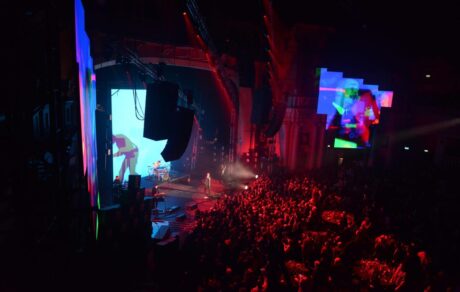
LONDON – One of the highlights of the music industry’s calendar, the annual NME Awards, took place last month in London with its most ambitious AV design to date, centred around a 158 panel ROE Black Onyx staggered LED display lining the perimeter of the stage, and employing four Tessera SX40 high capacity processors combined with eight Tessera XD data distribution units from Brompton Technology.
More details from Brompton Technology (www.bromptontech.com):
After a year off, the NME Awards returned to London’s O2 Brixton Academy to celebrate the best of 2019’s musical talent. It was attended by Taylor Swift, who picked up the award for Best Solo Act In The World, and featured live performances from AJ Tracey, FKA Twigs, rising stars Yungblud and Beadadoobee, a collaboration between rapper Slowthai and Mura Masa, and a five-song closing set by The 1975. UK LED screen and video production company, IMAG Displays, was tasked with delivering the screen requirements, which included coordination of content for 35 awards and the multiple live performances.
“We were given a brief to provide a very unique and innovative deconstructed LED screen, and deliver the entire AV package from rigging right through to content delivery,” explains Charli Harding, co-founder and director of IMAG Displays. “The large-scale design involved LED panels, staggered stage left and right in step fashion, which was a big challenge requiring carefully balanced weight load and rigging from the roof due to the size.”
The design was created by Mark Connolly and Stuart Nunn of Black Book Production, a freelance production director contracted to the award-winning Broadwick Studio, which was the production company for the awards.
“We’ve worked with Mark a lot over the years, including projects with Samsung and Nike,” explains Alex Strachan, Founder & Technical Director of IMAG. “We specified our 2mm ROE Black Onyx matched with the Tessera SX40 processors, plus backups, and eight Tessera XD data distribution units because both brands are industry leaders in LED technology and delivery.”
Work on the project began in November, with design drawings, weight calculations and content maps. The concept phase took approximately a month of planning, followed by multiple site visits and production meetings. On build up, it took two days to construct the LED wall.
“There was a lot of cabling involved – around 800m of fibre multicores in total – which would have been 4000m if we hadn’t used the XDs. Brompton made build up much faster and more efficient as it seamlessly allowed us to plot the LED panels, and allowed us to continuously test as we were building,” continues Strachan.
Brompton’s Tessera SX40 processor offers support for full 4K screens at 60Hz with 12 bits per color output, a zero-latency up/down scaler that matches the source to the screen, plus all of Tessera’s industry-leading processing features such as ChromaTune color correction and On Screen Color Adjustment (OSCA). In the field, the processor is often combined with the Tessera XD distribution unit, a sophisticated single box solution designed to manage the complications of mass cabling that can arise with large LED display systems.
“We knew the Awards production team would be under immense pressure on the night, managing the logistics and number of artists performing,” comments Brompton’s Senior Business Development Manager, Rob Fowler. “We had great confidence that the Tessera range would help them navigate the evening, from the screen resolution and the coloring quality, processing power and reliability, through to the easy drag ‘n drop and live editing workflows.”
“Brompton processing was key to the success of the show. It made the content creators’ journey straightforward and the job easier for the technicians on site,” concludes Harding. “Brixton is a challenging venue, and we had to work with specialized rigging companies to achieve the design. A lot of people said what we were attempting wasn’t possible but, with the help of Brompton processing, we did it!”


